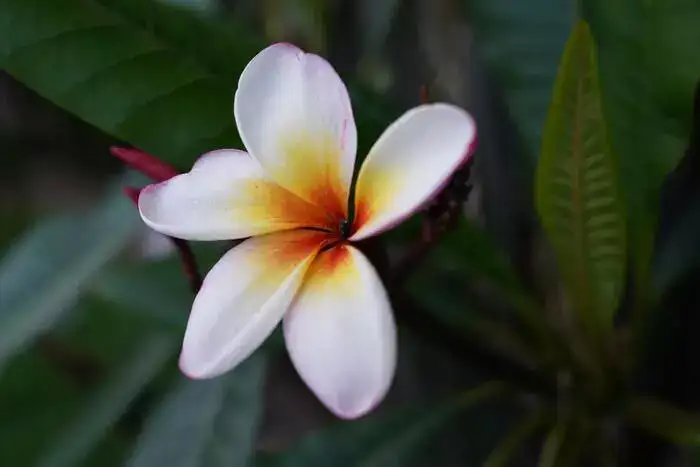Welcome to the world of plumerias, where fragrant flowers in hues of pink, yellow, and white enchant the senses. But achieving that perfect plumeria display requires the best fertilizer for plumerias. Whether it's the vibrant colors, the robust growth, or the sweet fragrance, each aspect of your plumerias requires careful attention and nourishment. So let's explore the ideal fertilizer for your tropical gems and discover how to promote healthy growth and environmental sustainability.

Our Top Picks
Best Fertilizer for Plumeria Flowering: J.R. Peters Jack's Classic Blossom Booster
Best Tropical Fertilizer for Plumerias: Grow More Hawaiian Bud and Bloom
Best Water-Soluble Fertilizer for Plumerias: Scotts Super Bloom Water Soluble Plant Food
Best Specialized Fertilizer for Plumerias: Nelson Plant Food NutriStar Plumeria Food
Best Organic and Natural Fertilizer for Plumerias: Dr. Earth Organic and Natural Exotic Blend
Best Nutrient Enhancer for Plumeria Flowering: Humboldt's Secret Flowering Flower Stacker
Best Phosphorus-Heavy Fertilizer for Plumeria Root Growth: Espoma Organic Bone Meal 4-12-0
Best Bloom Booster for Plumerias: Flower Fuel Bloom Booster
: J.R. Peters Jack's Classic Blossom Booster
Best Tropical Fertilizer for Plumerias: Grow More Hawaiian Bud and Bloom
Best Water-Soluble Fertilizer for Plumerias: Scotts Super Bloom Water Soluble Plant Food
Best Specialized Fertilizer for Plumerias: Nelson Plant Food NutriStar Plumeria Food
Best Organic and Natural Fertilizer for Plumerias: Dr. Earth Organic and Natural Exotic Blend
Best Nutrient Enhancer for Plumeria Flowering: Humboldt's Secret Flowering Flower Stacker
Best Phosphorus-Heavy Fertilizer for Plumeria Root Growth: Espoma Organic Bone Meal 4-12-0
Best Bloom Booster for Plumerias: Flower Fuel Bloom Booster
Why trust us?
ColumbiaFlorist has extensive knowledge and experience in the care and maintenance of plumerias. We understand the importance of using the right fertilizers to promote healthy growth and flowering of these beautiful plants. Our research on the best fertilizers for plumerias is based on rigorous testing and evaluation of a wide range of products, taking into account factors such as nutrient content, effectiveness, and safety. With our recommendations, you can trust that you are using the most appropriate and effective fertilizers for your plumerias, helping them thrive and bloom beautifully.
Also read: Best fertilizer for indoor plants
TL;DR
Plumerias are tropical plants that require a balanced source of nutrients to grow and bloom well. Here are eight popular fertilizer options for plumerias:
- J.R. Peters Jack’s Classic Blossom Booster: This fertilizer is specifically formulated for blooming plants and contains a high level of phosphorus to promote flowering.
- Grow More Hawaiian Bud and Bloom: This fertilizer is designed for use in tropical climates and provides a balanced source of nutrients, including nitrogen, phosphorus, and potassium, to promote healthy growth and abundant blooms.
- Scotts Super Bloom Water Soluble Plant Food: This water-soluble fertilizer provides a quick-release source of essential nutrients, including nitrogen, phosphorus, and potassium, to promote healthy growth and abundant blooms.
- Nelson Plant Food NutriStar Plumeria Food: This fertilizer is specifically formulated for plumerias and contains a balanced source of essential nutrients, including nitrogen, phosphorus, and potassium, to promote healthy growth and abundant blooms.
- Dr. Earth Organic and Natural Exotic Blend: This organic and natural fertilizer provides a balanced source of essential nutrients, including nitrogen, phosphorus, and potassium, to promote healthy growth and abundant blooms.
- Humboldt's Secret Flowering Flower Stacker: This fertilizer contains a proprietary blend of essential nutrients and trace minerals to promote healthy growth and abundant blooms.
- Espoma Organic Bone Meal 4-12-0: This organic fertilizer provides a slow-release source of phosphorus to promote blooming, and can be used in conjunction with other fertilizers to provide a balanced source of essential nutrients.
- Flower Fuel Bloom Booster: This high-phosphorus fertilizer is specifically formulated for blooming plants and provides a quick-release source of essential nutrients, including phosphorus, to promote abundant blooms.
Also read: Best fertilizer for grass
J.R. Peters Jack’s Classic Blossom Booster
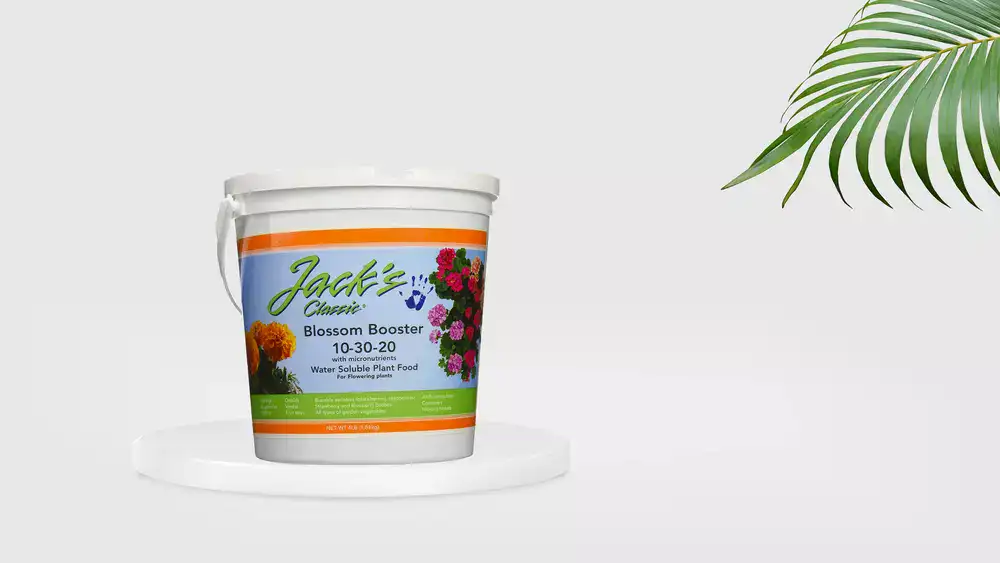
Jack's Classic Blossom Booster is a water-soluble powder fertilizer that is specially designed to promote large, vibrant flowers in outdoor plumeria plants and other flowering plants. With its high NPK ratio of 10-30-20, it provides essential macronutrients that support plant and soil health, which leads to healthy plants and bold blooms. The product contains 7 essential micronutrients that are critical for maintaining healthy soil and promoting growth.
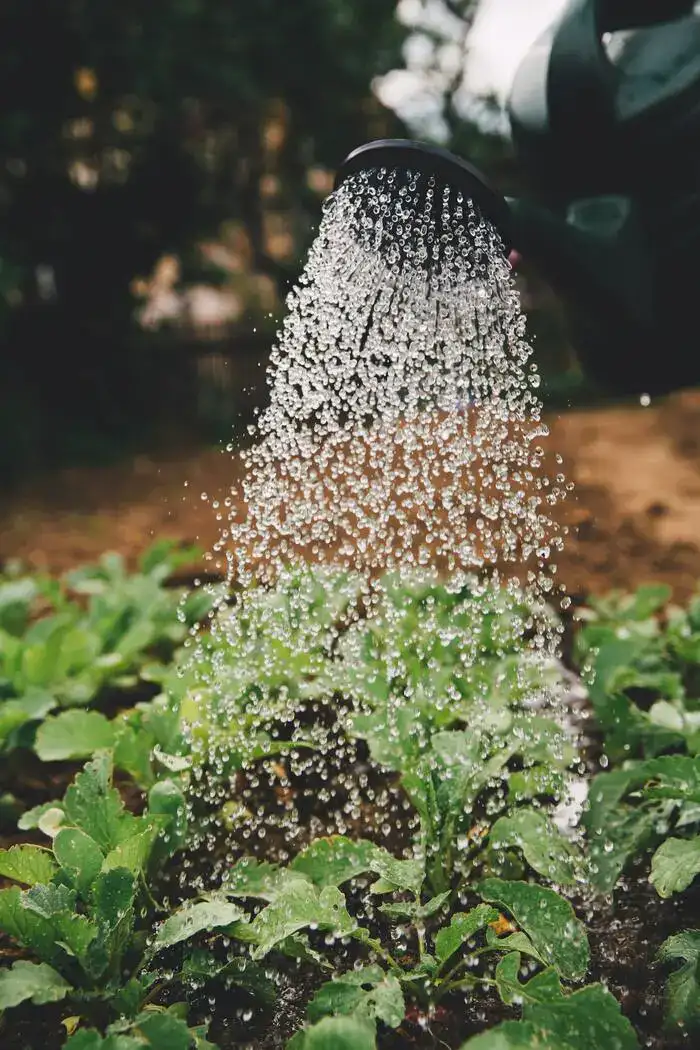
In terms of application, 1 tablespoon of Jack's Classic Blossom Booster should be mixed with 1 gallon of water and used every 7 to 14 days. The product is highly concentrated, so users should be careful not to accidentally overuse it. The fertilizer is high in phosphorus, which makes it ideal for use during periods of bud set to increase the number and size of blossoms. It's recommended to use warm water to dissolve the product, and the E.C. value is the best method to determine its strength.
However, there are some cons to consider. The appearance of the fertilizer may vary in color due to variations in raw material size and tracer dye distribution upon the particles in the bag. Additionally, some raw materials may dissolve more slowly than others, so it's important to keep the stock tank covered to reduce light and debris inputs.
In terms of the included durable poly pulsating sprinkler, it's suitable for gentle lawn watering and has an extra-wide weighted base that resists tipping. The adjustable control allows users to select a watering distance and coverage angle that best suits their specific needs. Jack's fertilizers are made with 100% soluble raw materials that form a true solution, ensuring that the nutrients reach the plants effectively.
Also read: Best fertilizer for vegetable garden
Overall, Jack's Classic Blossom Booster is a great choice for those looking for a fertilizer that promotes healthy plants and bold blooms. Its high NPK ratio, essential micronutrients, and convenient application method make it a top pick for anyone looking to boost the health of their outdoor plumeria plants or other flowering plants.
Grow More Hawaiian Bud and Bloom
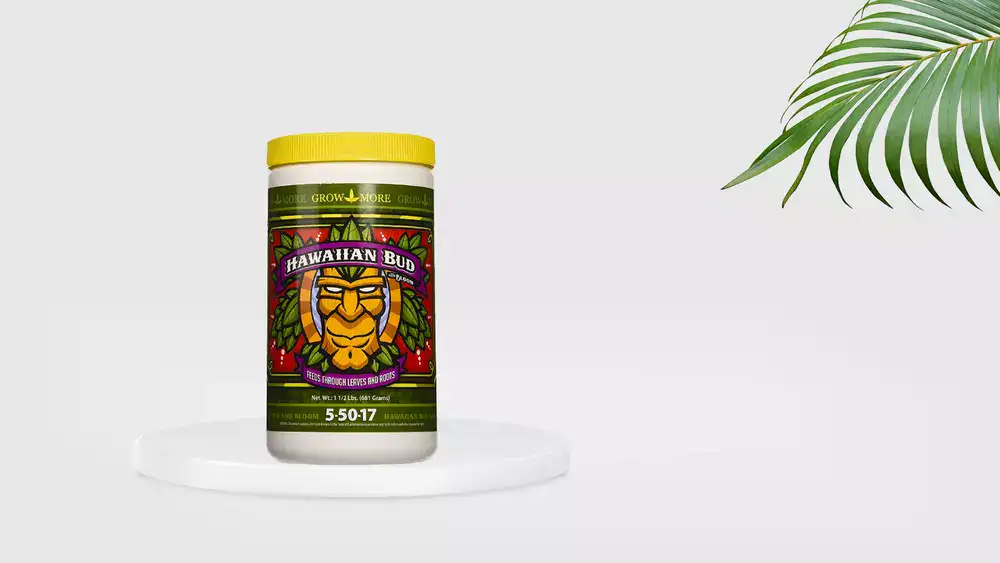
Grow More Hawaiian Bud and Bloom is a water-soluble powder fertilizer that is specifically designed for tropical plants, including plumeria and other flowering plants such as hydrangeas, mums, and impatiens. With its high phosphorus content (NPK ratio of 5-50-17), it provides the essential nutrients that these plants need to produce large, vibrant flowers. The fertilizer can be applied directly to the soil or diluted in water and sprayed.
For foliar spray applications, users should dissolve 1 teaspoon of the fertilizer in a gallon of water and spray it on dry plumeria leaves. For soil drench applications, users should dissolve 1 tablespoon in a gallon of water and apply it to the soil. It is recommended to apply the fertilizer once every other week during the flowering season from late spring until late summer.

One of the benefits of Grow More Hawaiian Bud and Bloom is that it contains both macronutrients and micronutrients, making it a comprehensive solution for promoting healthy plant growth and vibrant blooms. It's also a urea-free concentrate, making it safe for all orchids, bromeliads, guzmanias, tropical succulents, and xerophytes. The fertilizer is also fortified with chelated micronutrients that are readily absorbed by plant foliage or roots.
This fertilizer is considered one of the best bloom formulas in commercial agriculture and is designed to supply phosphate and potash for the late flowering cycle. It's fortified with six trace elements, plus Humic Acid and Norwegian kelp extract, to help produce heavy weight flowers and buds. Additionally, the correct nutrient ratio in the formula helps to mobilize essential oils and resins in aromatic flowering plants.
However, it's worth noting that the directions for using the fertilizer don't specify the frequency of usage. Additionally, while Grow More Hawaiian Bud and Bloom is developed for use in various systems, including soilless, hydroponic, organic soils, coco coir, and aeroponic systems, it's important to carefully follow the recommended dosages and application methods.
In conclusion, Grow More Hawaiian Bud and Bloom is a top choice for anyone looking to promote healthy growth and bold blooms in their tropical or flowering plants. Its high phosphorus content, chelated micronutrients, and versatility make it a great choice for a wide range of plant types.
Scotts Super Bloom Water Soluble Plant Food
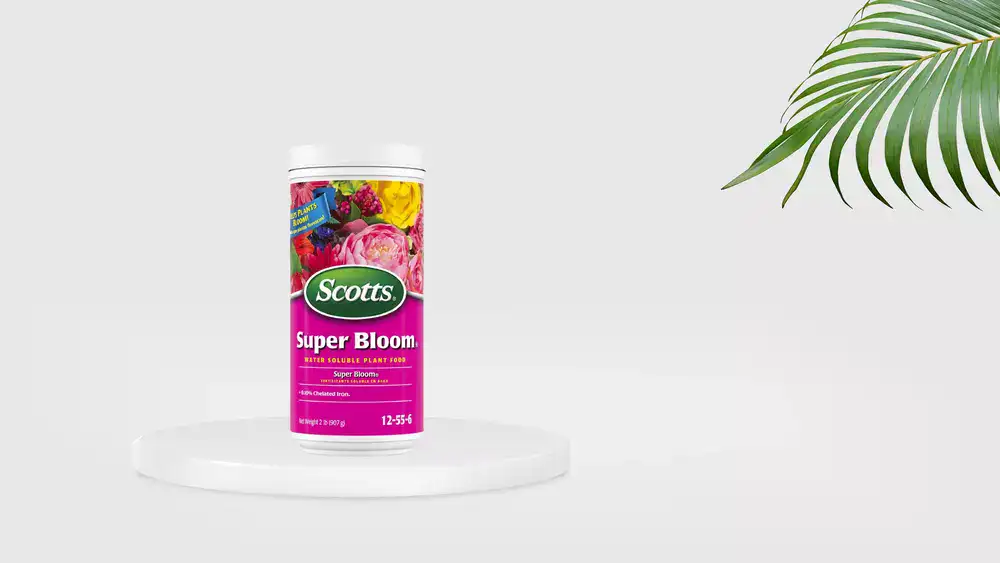
Scotts Super Bloom Water Soluble Plant Food is a high-quality fertilizer that is designed for use on plumeria and other outdoor flowers, fruiting plants, containers, and flower bed areas. With its water-soluble powder form, it is easy to mix and use, making it an affordable and convenient option for gardeners and plant enthusiasts.
The NPK ratio of the fertilizer is listed as either 10-52-6 or 12-55-6, with a high phosphorus content that makes it especially ideal for boosting plumeria blooms. The fertilizer follows the recommended formula for flowering plants by increasing the phosphorus levels while keeping nitrogen levels to a minimum. It is recommended to add 2 teaspoons of the fertilizer to every gallon of water and to use it every other week during the flowering season.
One of the benefits of Scotts Super Bloom is that it is safe for all flowering plants and fruit trees, and it won't burn plants when used as directed. To use the fertilizer, simply dissolve 1 tablespoon of the powder in 1 gallon of water and water the plumeria around its base.
However, it's worth noting that the fertilizer contains only one micronutrient, which is fewer than comparable products. Additionally, it's important to be careful not to overuse the fertilizer, as it is highly concentrated.
In conclusion, Scotts Super Bloom Water Soluble Plant Food is a great option for anyone looking to promote healthy growth and vibrant blooms in their plumeria and other outdoor plants. Its high phosphorus content, easy-to-use formula, and affordability make it a top pick for gardeners and plant enthusiasts.
Nelson Plant Food NutriStar Plumeria Food
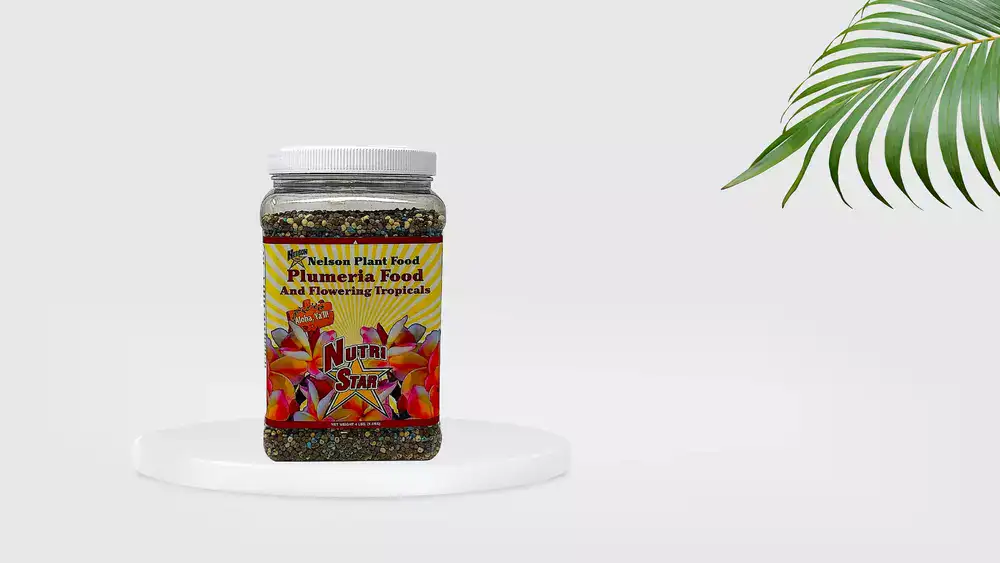
Nelson Plumeria and All Flowering Tropical Evergreen Plants Food is a granular fertilizer that is specifically designed for plumeria and other flowering tropical plants. With its NPK ratio of 5-30-5, it provides essential nutrients to promote healthy growth and vibrant blooms. The fertilizer contains five types of nitrogen to feed plumeria plants and a high level of phosphorus to encourage bloom growth. It also contains micronutrients, including sulfur, which can help bring the soil to the proper acidity.
One of the benefits of the Nelson fertilizer is that it releases nutrients slowly, keeping plants healthy without causing foliage overgrowth. This makes it an effective solution for all flowering tropical plants. To use the fertilizer, simply add the specified amount based on the plumeria's container size and water the plant after application.
Additionally, the fertilizer is easy-to-use and comes in granular pellets that can be applied quickly and easily. It's available in four different sizes (2 lb, 4 lb, 15 lb, and 25 lb), making it a convenient choice for gardeners of all sizes. The fertilizer contains balanced ingredients and specific micronutrients that promote brilliant color and well-formed blooms, making it the best fertilizer for tropical plants.
However, it's worth noting that the fertilizer contains synthetic ingredients, so it may not be the best choice for those looking for an all-natural solution.
In conclusion, Nelson Plumeria and All Flowering Tropical Evergreen Plants Food is a great choice for anyone looking to promote healthy growth and vibrant blooms in their plumeria and other flowering tropical plants. Its slow-release nitrogen, micronutrients, and easy-to-use formula make it a top pick for gardeners and plant enthusiasts.
Dr. Earth Organic and Natural Exotic Blend
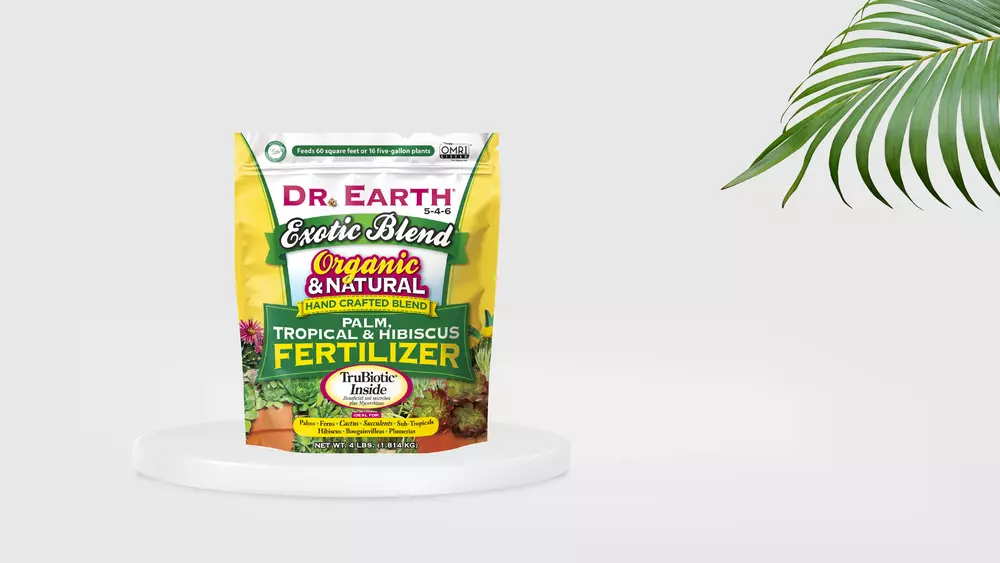
Dr. Earth Organic and Natural Exotic Blend is a premium quality, organic fertilizer that is safe to use on palm, tropical, and hibiscus plants, including outdoor container-grown plumeria. With its NPK ratio of 5-4-6, it provides essential nutrients to promote healthy growth in these exotic plants.
One of the benefits of the Dr. Earth fertilizer is that it is organic and GMO-free, and it doesn't contain any toxins or harsh chemicals that might damage other plants or prove to be toxic to pets and humans. It contains probiotics and seven strains of microbes that benefit the soil and speed up the breaking down of organic materials. This ensures that organic nutrients are thoroughly broken down and then released in the soil for plant roots to absorb them as they are needed, contributing to drought tolerance, enhanced nutrient availability, and increased plant performance.
The fertilizer is easy to use, and for outdoor container-grown plumeria, gardeners simply need to add 2 tablespoons of fertilizer for every 6 inches of pot diameter, and apply the product every 2 months. However, it's worth noting that the fertilizer contains minimal phosphorus, which may not be ideal for gardeners looking to encourage big blooms on an established plant.
Dr. Earth is a sustainable brand that converts over 720,000 tons of green materials into premium soil products each year, and is the pioneer of sustainable management of biodegradable resources. The fertilizer is manure and odor-free, and is organic transparency certified by various organizations, including OMRI (Organic Material Review Institute), OIM (Organic Input Materials), CCOF (California Certified Organic Farmers), and NOP (National Organic Program). It is sustainably made in the U.S.A. and is the only non-GMO project verified fertilizer in the country, making it people and pet safe.
In conclusion, Dr. Earth Organic and Natural Exotic Blend is an excellent choice for gardeners looking for a high-quality, organic fertilizer for their plumeria and other exotic plants. Its organic and GMO-free formula, probiotics and microbes, and sustainable production make it a top pick for those looking to positively impact the environment while promoting healthy growth in their plants.
Humboldt's Secret Flowering Flower Stacker
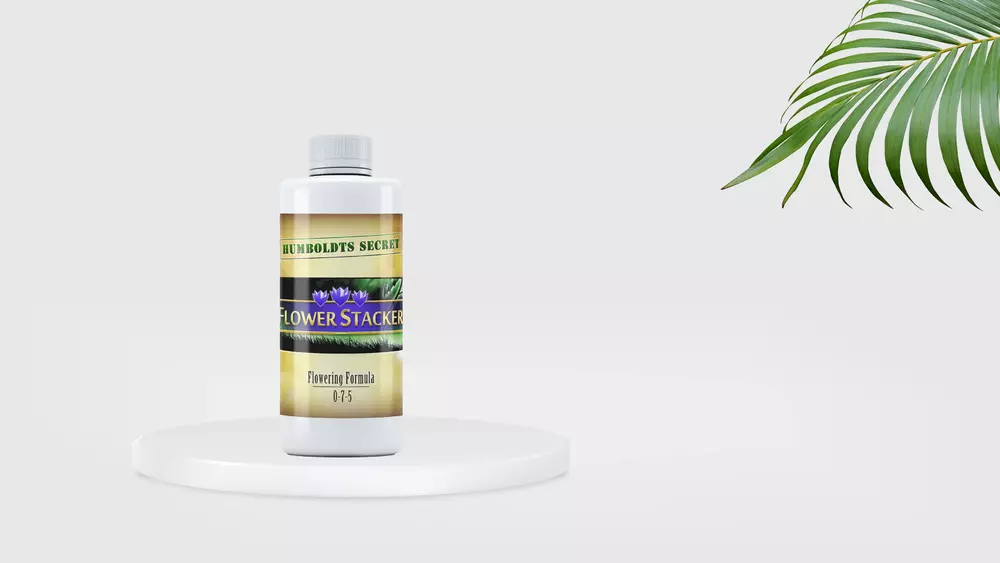
Humboldt's Secret Flowering Flower Stacker is a highly concentrated liquid fertilizer with an NPK ratio of 0-7-5, making it an ideal choice for young and newly transplanted plumeria plants. The gentle nutrient composition ensures that the fertilizer won't kill the plant even if a mistake is made, making it beginner-friendly. The fertilizer is highly concentrated, and one bottle makes at least 29 gallons, making it a good value for money.
The Humboldts Secret Flower Stacker is designed to act as a flowering additive, which helps increase the yield and flower density of plants. It's an ideal nutrient solution for potting soil for both indoor and outdoor plants and contains Vitamin B1, which is touted as a cure-all for transplant shock and supports better plant establishment and growth in a wide range of plants. The fertilizer also contains high amounts of phosphorus and potassium, which improve soil/foliar nutrient conditions for better crop yields during the flower development phase.
The flowering boosters like Flower Stacker are important in the hydroponic and agricultural industries and are used as an additional flowering agent by thousands of growers to maximize their yields. The clean-running formula of the Flower Stacker is effective in harnessing the power of the nutrients to help improve the growth and development of flowers in plumeria plants.
In conclusion, Humboldt's Secret Flowering Flower Stacker is an excellent choice for gardeners looking to improve the yield and flower density of their plumeria plants. Its gentle nutrient composition, highly concentrated formula, and effectiveness as a flowering additive make it a top pick for those looking to enhance their gardening efforts.
Espoma Organic Bone Meal 4-12-0
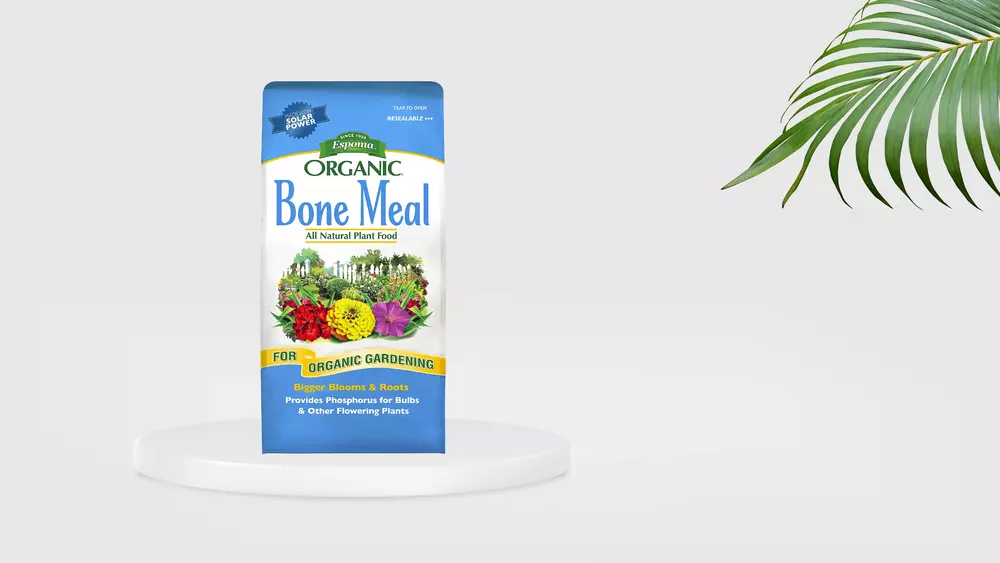
The Espoma Organic Bone Meal is a natural and organic fertilizer that is perfect for promoting healthy growth in various plants, including plumeria. The product contains 4-12-0 NPK ratio, which means it is high in phosphorus, a vital nutrient for flowering plants. This bone meal is made from 100% pure domestic bones, making it a safe and effective option for organic gardening.
This product is easy to use and can be incorporated into the soil at the time of planting. For bulbs, the recommended application rate is 10 pounds per 100 sq. ft, and for individual bulbs, 1 teaspoon of bone meal per bulb. For shrubs and trees, 1 or 2 pounds can be applied depending on their size, and for potted plants, 2 oz or 1 heaping tablespoon per pot can be added.
Espoma Organic Bone Meal is an excellent choice for those who are looking for a natural fertilizer option. It provides a long-lasting source of nitrogen, phosphorus, and calcium, which can help to encourage healthy growth in plants. Additionally, it is approved for organic gardening and is a registered Organic Input Material, ensuring that it meets all organic production requirements.
Plants that can benefit from Espoma Organic Bone Meal include spring-planted bulbs like anemones, calla lilies, dahlias, and tulips, and fall-planted bulbs like daffodils, hyacinth, and tulips. This bone meal is an essential product for gardeners and growers who are looking for an effective and natural way to promote healthy growth in their plants.
Flower Fuel Bloom Booster
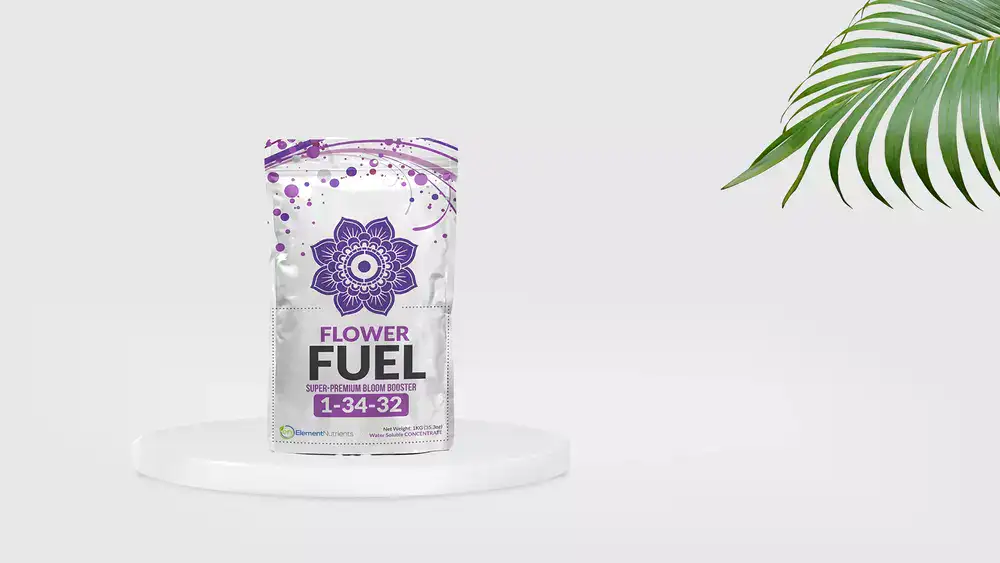
Flower Fuel is a bloom booster fertilizer designed specifically for plumeria plants. This fertilizer is designed to be used in conjunction with a base flower nutrient and contains a high concentration of phosphorus and trace minerals. The high phosphorus content in Flower Fuel promotes large blooms without overgrown foliage, which is ideal for plumeria plants. The trace minerals in this fertilizer help to optimize the overall health of the plant.
At ColumbiaFlorist, we use Flower Fuel by mixing ¼ teaspoon of the fertilizer with 1 gallon of water and using the mixture to water the plumeria plant. This fertilizer is highly concentrated, so it is important to follow the instructions carefully to ensure that you are getting the best results. We add 1/4 teaspoon of Flower Fuel per every gallon of feed water during the entire flower cycle to promote large blooms and healthy foliage.
Flower Fuel is formulated with chelating agents, vitamins, hormones, and highly bioavailable forms of phosphorus and potassium to encourage plumeria plants to absorb and utilize essential nutrients and organic compounds at an accelerated rate. This helps to maximize yields and improve the quality of crops.
At ColumbiaFlorist, we appreciate the care and attention that has gone into creating Flower Fuel. With over 40 high-end and proprietary ingredients, this fertilizer is designed specifically to promote large blooms and healthy foliage in plumeria plants. If you're looking for the best fertilizer for your plumeria plant, Flower Fuel is definitely worth considering, especially when used according to the instructions provided.
What to Consider When Choosing the Best Fertilizer for Plumerias
- NPK ratio: Plumerias require a fertilizer with a high phosphorus content to promote flowering. Look for a fertilizer with an NPK ratio of around 10-30-10.
- Slow-release vs. liquid fertilizers: Slow-release fertilizers gradually release nutrients over a longer period of time, while liquid fertilizers provide a quick boost of nutrients. Consider your preference and the needs of your Plumeria.
- Organic vs. synthetic fertilizers: Organic fertilizers are derived from natural sources and release nutrients slowly over time, while synthetic fertilizers are made from chemicals and provide a quick nutrient boost. Organic fertilizers are often more sustainable and environmentally friendly.
- Seasonal needs: Plumerias have different nutrient requirements during different stages of growth. For example, they need more nitrogen during the growing season and more phosphorus during the blooming season.
- Soil pH: Plumerias prefer slightly acidic soil with a pH between 6.0 and 7.0. Choose a fertilizer that is compatible with your soil pH to avoid damaging your plants.
- Fertilizer frequency: Plumerias require regular fertilization during the growing season, but too much fertilizer can be harmful. Follow the instructions on the fertilizer package and avoid over-fertilizing.
Most asked questions when fertilizing plumerias:
Do Plumerias Need Fertilizing to Bloom?
Yes, plumerias do need fertilizing in order to bloom. Regular fertilization provides the essential nutrients that the plant needs to grow healthy and produce flowers.
How to Fertilize Plumeria Trees?
Plumeria trees should be fertilized every 2-4 weeks during the growing season (spring to fall) with a balanced fertilizer that contains equal amounts of nitrogen, phosphorous, and potassium. Fertilizer can be applied as a liquid or granular form and can be watered in or sprinkled around the base of the plant.
How Often to Feed Plumeria?
Plumeria trees should be fed every 2-4 weeks during the growing season (spring to fall). In the winter, when the plant is dormant, fertilization can be reduced or stopped altogether.
How do I get my plumeria to flower?
To get your plumeria to flower, make sure it is planted in a location that receives full sun, has well-drained soil, and is fertilized regularly. Additionally, regular pruning and removing spent flowers can also encourage the plant to produce more flowers.
Can plumeria get too much sun?
Yes, plumeria can get too much sun, which can cause the leaves to scorch and turn brown. It is important to find a location that provides the plant with enough sun to promote healthy growth, but also provides some shade to protect the leaves from direct sun exposure.
How often should I water my plumeria?
Plumeria should be watered deeply and infrequently, allowing the soil to dry out between waterings. In the growing season, it is recommended to water the plant once a week, or more often in hot and dry conditions. In the winter, when the plant is dormant, watering can be reduced.
Can you use orchid fertilizer on plumeria?
Yes, orchid fertilizer can be used on plumeria. Orchid fertilizer typically contains a balanced blend of essential nutrients, including nitrogen, phosphorous, and potassium, which are important for promoting healthy growth and flowering in plumerias.
How Do You Keep Plumeria Small?
To keep a plumeria small, it is important to prune the plant regularly and control its size by removing the tips of the branches. Additionally, growing the plumeria in a container can help to control its size, as the root system is restricted by the size of the pot.
How often should I fertilize my plumeria?
Plumeria should be fertilized every 2-4 weeks during the growing season (spring to fall) with a balanced fertilizer that contains equal amounts of nitrogen, phosphorous, and potassium.
How do you increase plumeria flowering?
To increase plumeria flowering, make sure the plant is planted in a location that receives full sun, has well-drained soil, and is fertilized regularly. Additionally, regular pruning and removing spent flowers can also encourage the plant to produce more flowers.
How often should I fertilize my potted plumeria?
Potted plumerias should be fertilized every 2-4 weeks during the growing season (spring to fall) with a balanced fertilizer that contains equal amounts of nitrogen, phosphorous, and potassium. In the winter, when the plant is dormant, fertilization can be reduced or stopped altogether.
What are the essential nutrients that plumerias need to thrive, and how do fertilizers provide these nutrients?
Plumerias need essential nutrients such as nitrogen, phosphorous, and potassium to thrive. These nutrients can be provided by fertilizers and promote healthy growth, leaf development, and flowering. Other essential micronutrients such as magnesium, calcium, and iron can also be provided by fertilizers to ensure that the plant has all the nutrients it needs to thrive.
What is the best type of fertilizer for plumerias, and how often should it be applied?
The best type of fertilizer for plumerias is a balanced fertilizer that contains equal amounts of nitrogen, phosphorous, and potassium. This type of fertilizer should be applied every 2-4 weeks during the growing season (spring to fall) and can be applied as a liquid or granular form.
What are the differences between organic and synthetic fertilizers, and which type is better for plumerias?
Organic fertilizers are derived from natural sources, such as compost and bone meal, and release nutrients slowly over time. Synthetic fertilizers are chemically manufactured and release nutrients quickly. Both types of fertilizers can be effective for plumerias, but it is important to choose a fertilizer that provides a balanced blend of essential nutrients and to follow the recommended application schedule.
Can over-fertilization harm plumerias, and what are the signs to watch for?
Yes, over-fertilization can harm plumerias and cause yellowing of the leaves, stunted growth, and reduced flowering. If you suspect that your plumeria is being over-fertilized, it is important to reduce the frequency and amount of fertilizer applied.
Should I use slow-release or water-soluble fertilizers for plumerias, and which brand is recommended?
Both slow-release and water-soluble fertilizers can be effective for plumerias, but it is important to choose a fertilizer that provides a balanced blend of essential nutrients. Some popular brands for slow-release fertilizers include Osmocote and Scotts, while popular water-soluble fertilizer brands include Jack's Classic and Peters Professional.
How do I choose the right fertilizer ratio (N-P-K) for plumerias, and what does each nutrient do?
The right fertilizer ratio (N-P-K) for plumerias will depend on the specific nutrient needs of the plant, which can be determined by a soil test. N stands for nitrogen, which promotes leaf growth and is important for maintaining the deep green color of the leaves. P stands for phosphorous, which promotes root growth and flowering. K stands for potassium, which promotes overall plant health and disease resistance.
What are some homemade fertilizer recipes that I can use for plumerias, and how effective are they?
Homemade fertilizer recipes for plumerias can include using coffee grounds, eggshells, and fish tank water. These homemade fertilizers can be effective in providing some essential nutrients to the plant, but it is important to remember that they may not provide a balanced blend of all the nutrients that the plant needs to thrive.
How does the pH level of the soil affect plumeria growth, and what type of fertilizer should I use to adjust the pH if necessary?
The pH level of the soil affects the availability of nutrients to the plumeria plant. A pH level between 6.0 and 7.0 is ideal for plumerias. If the soil pH is too high or low, it can be adjusted by adding soil amendments such as sulfur or lime. If the pH level needs to be adjusted, it is recommended to use a soil test kit to determine the current pH level and make necessary adjustments.
Are there any specific fertilization techniques or schedules that are recommended for plumerias grown in containers versus in-ground?
Plumerias grown in containers may need to be fertilized more frequently than those grown in-ground, as the nutrients in the soil are depleted more quickly in a container. It is recommended to fertilize potted plumerias every 2-4 weeks during the growing season with a balanced fertilizer. For in-ground plumerias, it is recommended to fertilize every 2-4 weeks during the growing season and reduce or stop fertilization in the winter.
What other cultural practices should I implement to promote healthy plumeria growth and flowering, in addition to fertilization?
In addition to regular fertilization, other cultural practices that can promote healthy plumeria growth and flowering include proper watering, pruning, and providing adequate sunlight. It is also important to keep the soil well-drained and to remove any dead or diseased growth to promote overall plant health.
Sources we used in this research:

